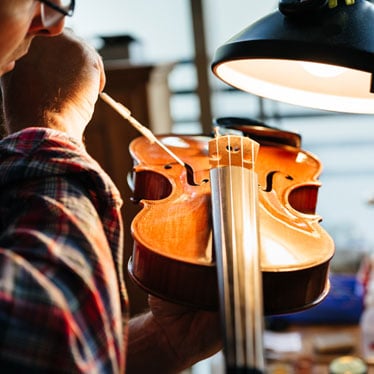How To Choose A Luthier

Playing a string instrument offers many pleasures for musicians, but it also comes with its share of pains. Your violin, or fretless instrument, is a fragile piece of artistry. Each piece, joint, and element is carefully crafted to produce a unique sound. In fact, they are so delicate that there are countless pages and books of information available on how to keep these instruments in their best condition.
The organic materials used to construct your string instrument are held together in perfect balance. The specialized assembly means that it is very easy to seriously mess up your instrument if you don’t know what you’re doing. If a repair needs to be done, it’s always better to trust a professional than to end up causing more damage by your amateur attempts.
New students, or any level musician, who doesn’t know the exact technique used for repositioning a soundpost or repairing loose joints and seams, needs to take their instruments to a qualified expert. Luthiers are specialized woodworkers who understand the delicate nature of instruments. They are able to create replacement parts and solve almost any problem. However, knowing how to choose a professional can be a challenge if you don’t know what qualities to look for.
The following tips offer advice for choosing a luthier you can trust to take great care of your expensive string instrument.
Check out associations and references:
Asking other musicians is the first order of business when choosing a luthier. You need to get advice from people who have used the same service. This can narrow down your options considerably. Depending on whether you live in a city or small town, there may only be a few qualified people able to make repairs to instruments nearby.
If possible, find out if the luthier has an association membership or the schools they’ve attended. This isn’t a must have, as some of the best craftsmen don’t join associations or they have learned their skill as an apprentice, but it can give you an indication of the person’s dedication to the craft. Check out:
- Association of Stringed Instrument Artisans' (ASIA)
- Guild of American Luthiers (GAL)
- American School of Lutherie
- Musician's Institute / Guitar Craft Academy
Observe the level of business and how the luthier handles it:
Odds are, if you’ve found an excellent luthier, that person will have plenty of business. String instruments are expensive, but your instrument is important to you regardless of its monetary worth. The luthier you choose should really care about instruments and will focus on each instrument as if it were the only one.
One good way to check if a luthier is qualified is to see how long the person has been in business. If you go to a store that sells instruments, the rule doesn’t apply too well, but if the shop you visit only focuses on repairs and has been operating for more than four years, it’s a safe bet.
Consider how comfortable you feel with the luthier and their attitude
Don’t get turned off if you go to an instrument shop that’s busy and the luthier is abrupt with you. Many gifted individuals do not have great people skills. If the person you talk to is cranky, corrects your terminology, or stops you while you’re describing the problem, you may have found a keeper. Sometimes the reason these luthiers get crabby is because they actually care about instruments and want to do a good job.
That person has dealt with enough instruments to know exactly how to diagnose your problem. If they seem agitated that you don’t understand exactly what’s wrong with your string instrument, be patient. He or she is a much better choice than someone who smiles and nods without really understanding the issue you’re having.
You don’t want to choose someone who has great social skills but doesn’t ask you specific questions about the problem. If it’s something like a separated side, no big deal. However, if you can’t figure out what’s causing the problem, you need an expert to help diagnose it, not someone who will make adjustments without solving the underlying issue.
Ask yourself:
- Did this person rush me without asking any real questions?
- Did they examine the instrument and point out any additional concerns?
- Does the luthier have references you can speak with?
A qualified professional will never be offended if you ask for a reference, especially if the repair is a serious one.
All string musicians will need the services of a luthier at some point in their life. By choosing a professional who knows their craft and cares about instruments, you can be sure that your expensive instrument is in good hands.
This article sponsored by Thomastik-Infeld


